The spring semester at Washington University in St. Louis was not supposed to end like this — with quiet labs and remote classrooms; canceled traditions and idle walkways; scattered friends and electronic colleagues.
But the coronavirus disease (COVID-19), which United Nations Secretary-General Antonio Guterres called on March 31 the most significant challenge the world has faced since World War II, changed everything. “This is much more than a health crisis,” Guterres said. “It is a human crisis. The coronavirus disease is attacking societies at their core.”
That the pandemic would indelibly alter the history of Washington University became evident early in the semester to university administrators, who began alerting the community about the emerging global health concern in late January.
But it became real for the community on March 11, when, on the same day the World Health Organization declared COVID-19 a pandemic, students were asked — in the middle of their spring break — to complete the remainder of the semester from their permanent residences and the university shifted operations to allow employees to work from home.
It was a decision not made lightly, but out of a desire to lessen the risk of community spread that likely would have occurred upon students’ return from spring break, and to help the St. Louis region to “flatten the curve” and slow the spread of the disease.
By March 16, five days later, the Commencement ceremony planned for May 15 was canceled, along with treasured spring traditions such as Thurtene and Reunion, WILD and recitals, the fashion show and final projects, which also were put on hold or moved online.
“There’s no point trying to sugar-coat it,” Chancellor Andrew D. Martin wrote in a universitywide communication March 23. “This is a tough and uncertain time. We’ve all had to turn on a dime to accommodate this rapidly changing situation.”
But this is WashU. As a community, we turned on that dime, picked it up and flipped it around, responding in numerous ways in the best way we know how — through research on the Medical and Danforth campuses; providing thought leadership and expertise to community stakeholders; helping make connections in the St. Louis region; and helping each other.
“It’s truly heartening to see how our community has mobilized to respond, and the myriad ways we’re coming together to navigate this new reality,” Martin said. “Now, perhaps more than ever, we are reminded how critical our mission is and the role each member of our community plays in helping us to advance it — the many ways we are #WashUtogether.”
Here are some of the ways the university community has responded:
Taking a lead role in research
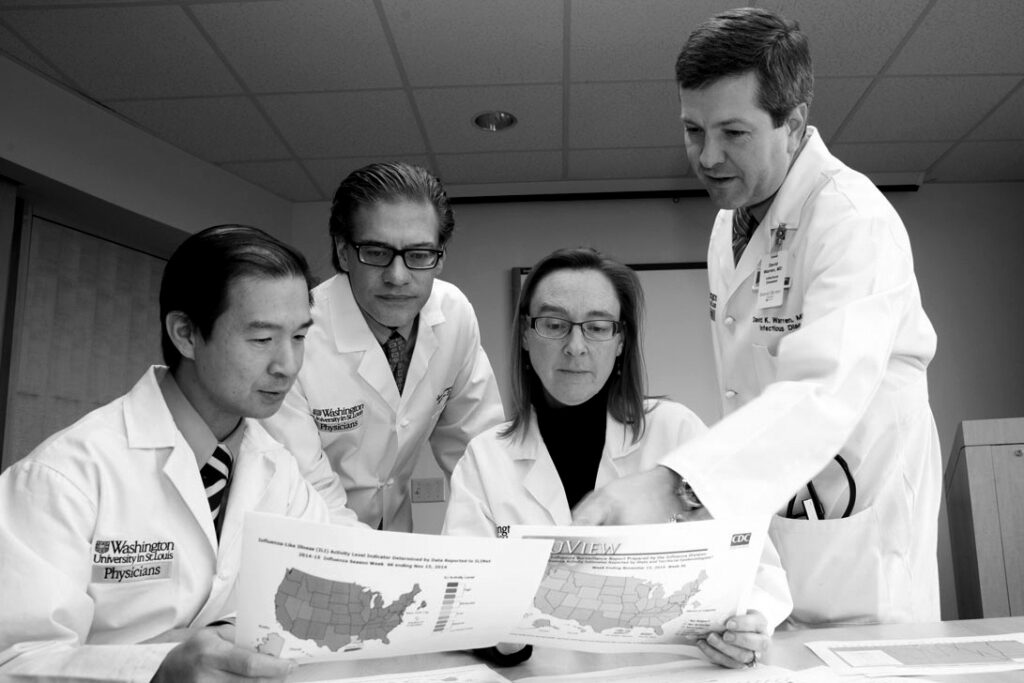
As the crisis moved from one of shock to one of navigating a new normal, it was hard to find a school or department not doing its part to help in some fashion. The School of Medicine, for starters, became one of a handful of major medical institutions investigating whether transfusions of blood plasma from people who have recovered from COVID-19 could be used to treat those seriously ill with the disease.
Indeed, the medical school mobilized like never before, “a strange privilege in a strange moment,” wrote David H. Perlmutter, MD, executive vice chancellor for medical affairs and the George and Carol Bauer Dean of the school in an April 2 message to the school’s faculty, staff, fellows, residents and students.
More than two-dozen principal investigators turned their labs over to COVID-19 research, doing everything from studying the behavior of the coronavirus to developing vaccines. Administrative support was offered through Washington University’s Institute of Clinical and Translational Sciences to coordinate such efforts.
By mid-April, a clinical drug trial was launched at the medical school to investigate the effectiveness of different combinations of antimalarial drugs and antibiotics in COVID-19 patients hospitalized at Barnes-Jewish Hospital.
“Whatever longterm plans we had are put on hold, and we are being called to use our gifts and our training to serve others right here and now, sometimes at great cost,” Perlmutter wrote. “As everyone around us turns inward and relies on safe distances, we rush out to lay hands on those who need our help. There will be more of those who need us in the coming days and weeks and, because of all of you, we will respond.”
Collaborations across campus also began taking place, with the McKelvey School of Engineering, School of Medicine, Arts & Sciences and the Sam Fox School of Design & Visual Arts teaming up to create supplies and equipment for use on the Medical Campus.
A group of researchers from the Sam Fox School led by Hongxi Yin, InCEES associate professor in advanced building systems and architectural design, began exploring whether using portable furnaces to sterilize contaminated building exhaust might help to stem the contagion.
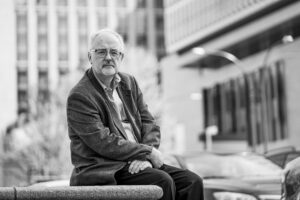
The Institute for Public Health, with an already robust infrastructure in place, jumped in as a resource in a variety of ways, from creating a comprehensive page of local resources to using the strength of each of its centers to provide leadership globally, in aging, in community health, data analysis and more.
“It is only through the collaboration of us all that we can realize the end of this unprecedented period in time,” said William G. Powderly, MD, the Dr. J. William Campbell Professor of Medicine and the Larry J. Shapiro Director of the Institute for Public Health.
Thought leadership in action
From the very beginning, School of Medicine infectious disease specialists, such as Steven J. Lawrence, MD, associate professor of medicine, were looked to as leaders in the fight, becoming go-to experts for news organizations.
“We as a region started some of our social distancing measures a little bit earlier ahead of the curve than other places did,” Lawrence told KSDK-TV in late March. “These measures, even though we haven’t been hit hard yet, right now is the time they are doing the most good. As inconveniencing and disruptive as they are, they are so, so important.”
Thought leaders on the Danforth Campus answered calls from all over the country. Among the faculty and researchers who responded were epidemiologists in public health from the Brown School, who sought to dispel myths and misconceptions about the virus.
Olin Business School’s Peter Boumgarden, professor of practice, strategy and organizations, was using his expertise to help local restaurants navigate a new normal, while his colleague Patrick Rishe, director of Olin’s Sports Business Program, was busy explaining the economic impact of no professional sports leagues and the cancellation of major events such as golf’s Masters Tournament.
John Inazu, the Sally D. Danforth Distinguished Professor of Law in the School of Law, was heard on NPR explaining the nuances of what the new federal stimulus package would mean for church and state, while Daniel Epps, associate professor of law, was offering perspective on whether the Supreme Court should delay its rulings.
Peter Kastor, chair of the Department of History in Arts & Sciences and professor of history and of American culture studies, wrote in The Washington Post about online learning and teaching and how his Arts & Sciences colleagues rallied to their new normal.
“Within 10 days,” Kastor wrote, “overseas students were accounted for, the science departments had plans for their laboratories, and Arts & Sciences was rolling out a host of training sessions to prepare us for a new technology landscape.”
Happiness expert Tim Bono, a lecturer in psychological and brain sciences and an assistant dean in Arts & Sciences, who researches positive psychology, offered tips on how to manage anxiety. “Identify opportunities to engage in behaviors that give us a sense of autonomy,” he told the St. Louis Post-Dispatch, “that allow us to take control of those aspects of our lives that we still are in control over.”
‘In St. Louis For St. Louis’
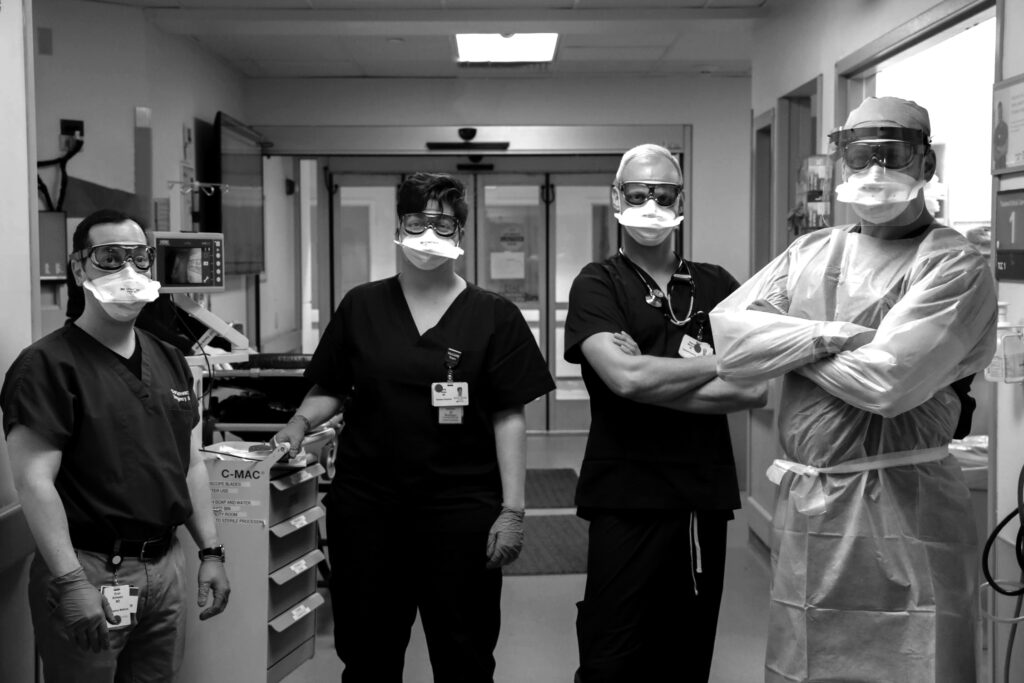
Washington University faculty, staff and students stepped up to help the St. Louis community — our home.
“From the physicians on the frontlines to the researchers tracking the virus to the faculty members who are helping businesses and nonprofits stay afloat, our community is showing up every day with compassion, commitment and ingenuity,” Martin said. “I am especially moved by the can-do spirit of our students who have launched organizations to tutor local students, deliver meals, provide child care and reach out to isolated seniors.”
On April 8, the COVID-19 Regional Response Team, a consortium of 43 St. Louis area nonprofits, social service agencies and governments was formed with the Brown School’s Jason Purnell, associate professor and director of Health Equity Works, leading the efforts.
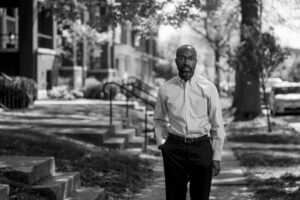
“Our region’s most vulnerable populations are historically underserved and this pandemic requires us to provide care and services in ways that no individual agency can accomplish on their own,” Purnell said. “An equitable response to this pandemic requires that we focus our attention on those at greatest risk of contracting this virus and those whose lives were lived in risk before this crisis.”
There were many others ways in which the university community responded in St. Louis. For example, the university is providing rooms and meals at the Knight Center and the Lofts apartments for doctors and nurses who need somewhere to stay amid their intense work caring for the sick during the COVID-19 pandemic.
Campus life goes on
Despite the unusual circumstances, the spring semester plowed forward. Every aspect of campus life moved online, including academic resources such as the Learning Center, The Writing Center and University Libraries. Large lecture classes were actively using Piazza, a forum where students can answer each other’s questions with input from instructors.
Even student health and wellness centers took charge in serving the community, from the Habif Center, which stepped up its efforts to reach students through social media, to the Sumers Recreation Center, which offered classes, training and advice online.
In a willingness to help students and employees facing financial hardship, a new fund was created by University Advancement, the WashU Crisis Response Fund, at the request of Chancellor Martin after alumni, parents and friends started reaching out to ask how they could help.
Among the many efforts of medical students were reviewing and summarizing emerging academic research on COVID-19 to save care providers valuable time; managing a coronavirus email “hotline”; providing child care for health-care workers; and delivering meals to infected and at-risk community members. Students also designed and manufactured more than 1,600 face shields for medical workers in need of personal protective equipment.
And the students, who are the heart and soul of Washington University, stepped up to help each other in unprecedented fashion. From the beginning, when the reality hit home that campus life in the spring semester would be disrupted like no other time, students mobilized to help each other the best way they knew how: through Facebook posts and other social media, Slack channels and the creation of a spreadsheet that provided valuable, instant resources.
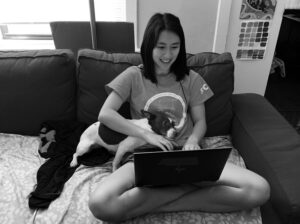
One such student is Jessica Yu, a junior biochemistry major in Arts & Sciences and a student program coordinator in the Office for Student Success. Yu posted links and resources on a Facebook page and used a Slack channel of Deneb STARS, a cohort program that provides community and support to low-income students, to disseminate information about changes on campus due to COVID-19.
“There was a lot of stress,” Yu said. “Students weren’t sleeping. I remember I woke up and checked my email and I was like, ‘Oh, everything is closed.’”
Yu said that because of her work with the undergraduate and graduate workers’ union she had more of a “reach” than a first-year student. “I knew a lot of graduate students, and some people in the city, and that plenty of people would be down to help,” Yu said. “Some of them were also instructors at the university and one reached out to help and asked, ‘Hey is it OK if I put your name down as someone for the students to reach out to?’
“I just wanted to create a space for people to talk and update them with information on the spreadsheet that had been created with student forms and contact information to try to ease student concerns,” Yu said, “And I offered myself as a resource for students.”
Early on, the Office for Student Success partnered with the Learning Center, said Anthony Tillman, assistant provost for student success, to provide support and instruction for online platforms, academic tutoring and coaching and mentoring. “Social distancing was a concern, but more importantly we worried about social isolation,” Tillman said. “We just didn’t want students to feel as if they had been abandoned.”
Online classes began on March 23, signaling a new normal of Zoom meetings, Slack phone calls and FaceTime chats. Meanwhile, students continued to help each other with resources on the spreadsheet and through social media channels, connecting each other with everything from work study forms so students could continue to get paid to information about how to get parking refunds to how to help through community outreach projects.
“I was amazed at how many people were willing to lend a hand, to open their doors and help with transportation,” Yu said. “This made me realize that WashU students themselves are capable of helping each other in so many ways.
“It reminds me of what is possible.”
WashU Response to COVID-19
Visit coronavirus.wustl.edu for the latest information about WashU updates and policies. See all stories related to COVID-19.
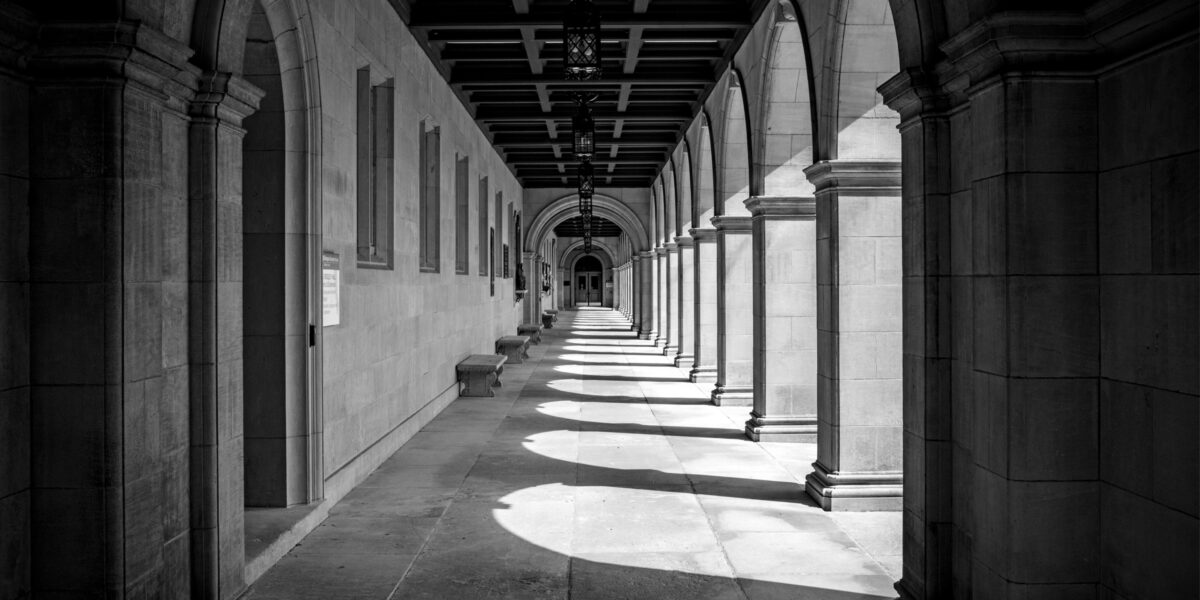
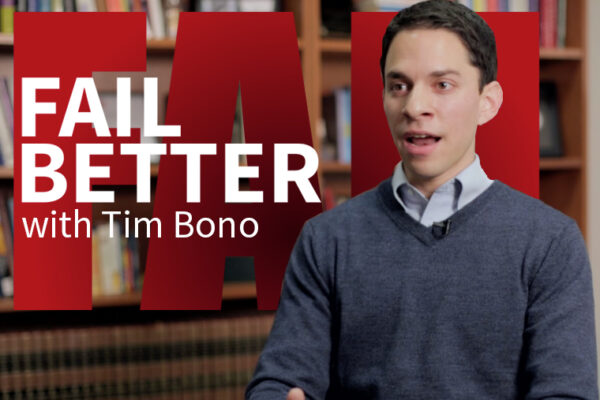
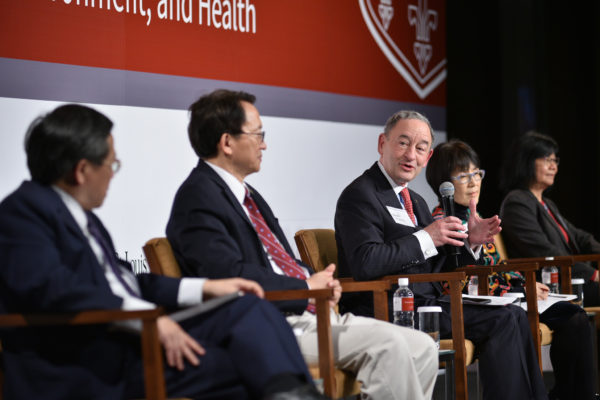
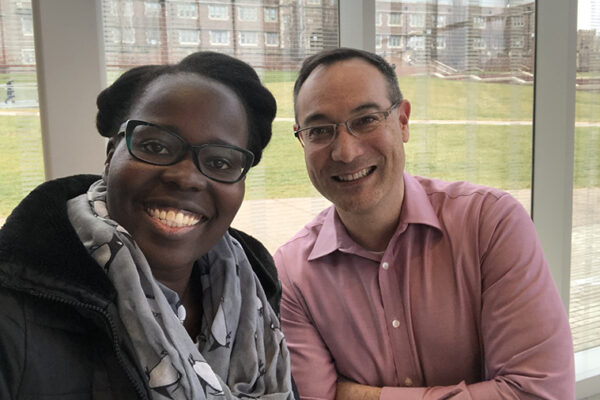
Comments and respectful dialogue are encouraged, but content will be moderated. Please, no personal attacks, obscenity or profanity, selling of commercial products, or endorsements of political candidates or positions. We reserve the right to remove any inappropriate comments. We also cannot address individual medical concerns or provide medical advice in this forum.